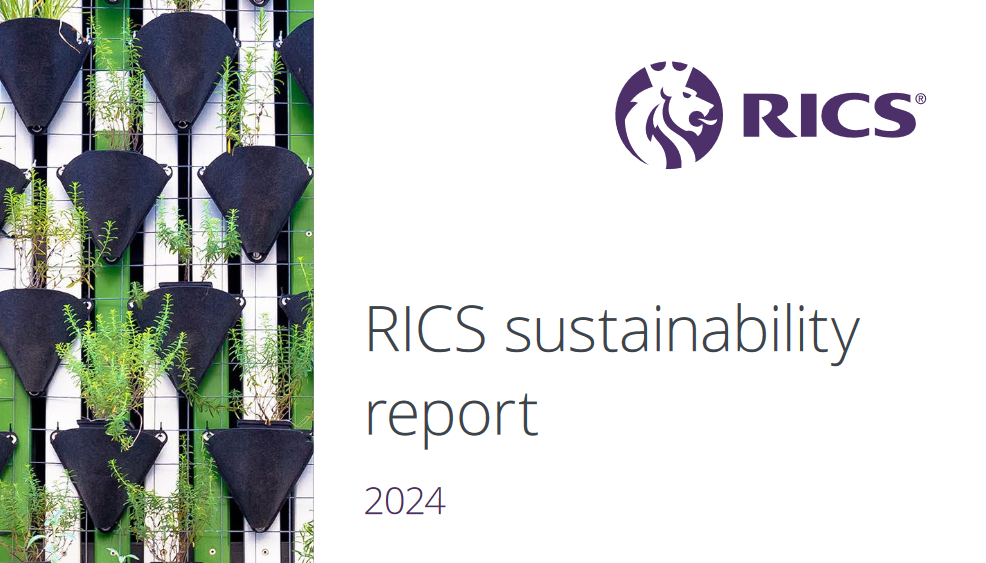RICS: Urgent action needed to decarbonise UK’s built environment by 2050 target

The Royal Institution of Chartered Surveyors (RICS) has today published its global sustainability report for 2024 which outlines the state of the world’s green and sustainable real estate, while also highlighting essential policy recommendations, to help drive the UK’s built environment sector towards decarbonisation.
While the UK has made some strides in carbon reduction across buildings and infrastructure, RICS stresses in the report that further action is needed to meet national and global climate goals.
To accelerate progress, RICS advocates for a comprehensive sustainability approach that includes evidence-based targets, mandatory carbon assessments (such as WLCA) for all new projects, and enhanced training for built environment professionals. The report also recommends that policymakers set clear, national targets to aid decarbonisation, alongside the enforcement of minimum energy performance standards, building codes, and climate resilience benchmarks.
On the demand side, 46% of respondents in Scotland reported that occupier demand for green or sustainable buildings has risen in the past year.
41% of respondents in Scotland report that they currently do not measure embodied carbon, which is slightly lower than the UK average which sits at 43%.
Looking at factors deemed to be holding back the industry, in Scotland, 31% of respondents state that a lack of government incentives and policy uncertainty is a barrier preventing the widespread adoption of sustainable practices across the industry.
In Scotland, high initial costs of sustainable or green building practices and materials appears to be a barrier, with 66% reporting this as a challenge for adopting sustainable construction practices.
21% of Scottish respondents stated that they measure biodiversity on all projects, while 65% report that they measure biodiversity on some projects.
To accelerate progress, RICS advocates for a comprehensive sustainability approach that includes evidence-based targets, mandatory carbon assessments (such as WLCA) for all new projects, and enhanced training for built environment professionals. The report also recommends that policymakers set clear, national targets to aid decarbonisation, alongside the enforcement of minimum energy performance standards, building codes, and climate resilience benchmarks.
To support the government and the industry’s shift toward sustainability, RICS standards, including our Whole Life Carbon Assessment (WLCA) and Retrofit standards, provide valuable frameworks to assist government efforts. These standards align with national goals by offering practical pathways for achieving sustainable outcomes.
Additionally, the recently launched ‘Net Zero Carbon Building Standard’ builds on this, creating clear guidelines to complement government initiatives and bolster the transition to net zero.
These figures could also increase further in the coming years due to the UK’s recent biodiversity net gain legislation. This legislation requires developers to improve the biodiversity of their sites by a minimum of 10%. The regulation became mandatory in February 2024 and is expected to extend to include major infrastructure projects in 2025.
Norman McLennan, chair of RICS (Scotland) Board, said: “In Scotland, we are making our own positive strides in working towards achieving net zero, but the results of the report point to a lack of carbon measurement, which is instrumental in meeting Scotland’s energy targets. To achieve targets, measurement must become common practice. The imminent publication of the Heat in Buildings Strategy Bill, which aims to encourage more homeowners to retrofit their houses using a fabric first approach and employ cleaner heating systems, such as heat pumps and heat networks will allow Scotland to make significant progress towards eliminating these emissions over the next decade.
“As chair of the newly formed RICS net zero, renewable energy and sustainability group, we will work collaboratively to feed into relevant policy areas and encourage professionals to embed net-zero carbon targets as industry standard in both decision making and procurement approaches, in order to build a sustainable future for society. As a group, we are optimistic that the planned future investment in Construction and the Built Environment will generate substantial multi-discipline opportunities for surveyors across Scotland and our profession in general.
“Additionally, there will be new opportunities as the UK Government commits to GB Energy and other energy infrastructure investments including onshore and offshore renewable energy projects, hydrogen and carbon capture, especially for those working in land, renewable energy and natural resources, built environment infrastructure and project management.”
RICS president, Tina Paillet, added: “Last year, I described the RICS Sustainability Report as a wake-up call to our industry, pointing out that our progress on sustainability was lagging behind what is required. Despite that, I expressed confidence that the 2050 net-zero target was still within reach, if we pursued it wholeheartedly. This year’s report, however, suggests that the level of commitment necessary to meet these goals is still lacking, presenting a mixed but underwhelming picture overall.
“Credible policy interventions are essential, and regulation remains a significant factor driving green real estate investment and shaping construction practices. RICS will continue to champion effective regulation and the adoption of common standards across jurisdictions to simplify processes, ensure a level playing field, and ultimately drive meaningful progress on climate goals.”





















